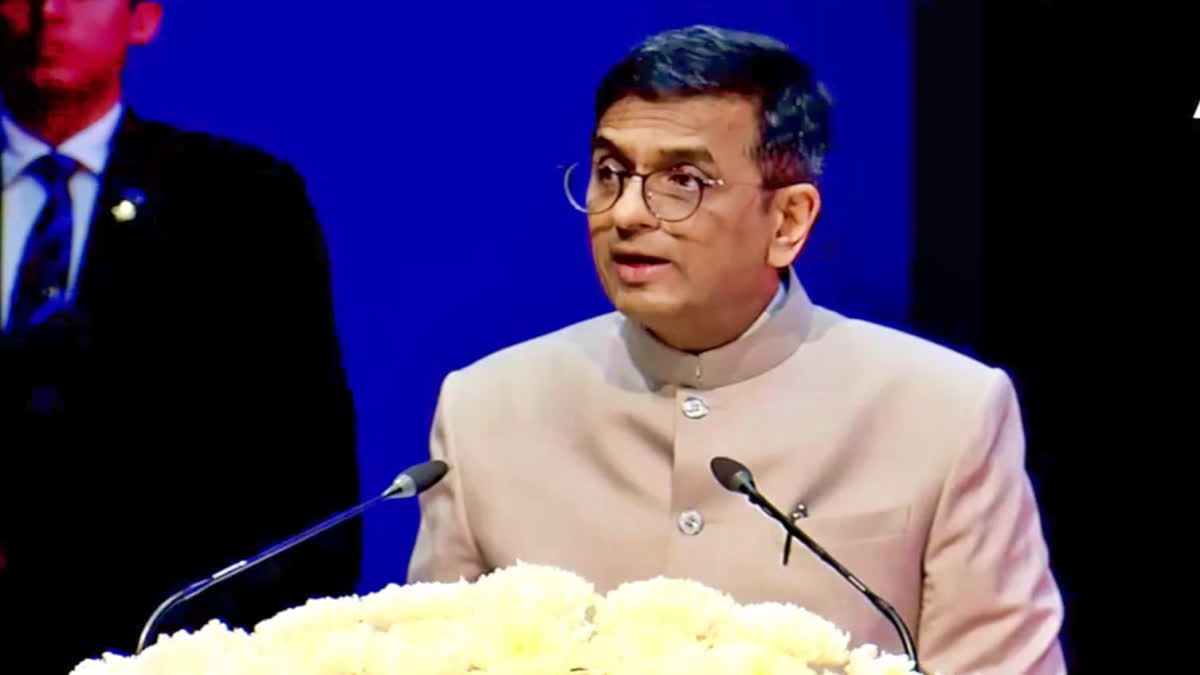New Delhi:The Chief Justice of India D Y Chandrachud on Sunday said the art of judging must be free of social and political pressure and from the inherent biases that human beings hold.
He emphasized that the court is not the sole guarantor, but it is the final arbiter that power may be used to liberate, emancipate and include, but never to oppress or ostracize, and also this court must secure the respect of citizens for it to establish itself as a legitimate institution. The CJI said efforts are being made from within the institution to educate and sensitize judges across courts to unlearn their subconscious attitudes inculcated by social conditioning on gender, disability, race, caste and sexuality.
The CJI, delivering a speech leading the ceremonial bench to mark the commencement of the diamond jubilee year of the Supreme Court, said an independent judiciary does not merely mean the insulation of the institution from the executive and the legislature branches but also the independence of individual judges in the performance of their roles as judges. All the 34 judges of the apex court were on the bench in the CJI’s courtroom.
“The art of judging must be free of social and political pressure and from the inherent biases which human beings hold”, CJI said. The CJI said the court is not the sole guarantor, but it is the final arbiter that power may be used to liberate, emancipate and include, but never to oppress or ostracize, and the novel challenges of today must never distract us from this most sacred duty of the court. Citing one of the three principles, which are necessary for the Supreme Court to function according to the constitutional mandate, the CJI said this court must secure the respect of citizens for it to establish itself as a legitimate institution, and “the confidence of our citizens is determinative of our own legitimacy”.
On pendency, the CJI said currently, a total of 65,915 registered cases are pending before the Supreme Court. The CJI said, “We need to ask hard questions on what needs to be done. There has to be a radical change in the approach to decision-making….. I believe that we have to have a common understanding of how we argue and how we decide and above all, on the cases which we select for decision making”. He said if we do not make hard choices and take difficult calls to resolve these pressing issues the euphoria generated from the past may well be short-lived.
“Efforts are being made from within the institution to educate and sensitize judges across courts to unlearn their subconscious attitudes inculcated by social conditioning on gender, disability, race, caste and sexuality”, he said. Justice Chandrachud said the legitimacy of this court is also derived from the confidence of citizens that it is a neutral and impartial arbiter of disputes which would deliver timely justice.
On disagreement between benches on various issues, the CJI said it is in this dialogical process between different benches that a conclusion closest to the constitutional framework is reached. “In multiple voices, we speak both to the present and the future. We may be, as it is sometimes called, a polyvocal court. But the strength of our polyvocal nature lies in its ability to adapt dialogue as a processual instrument in bringing together a synthesis of ideas. The synthesis in our court brings together diversity and respects inclusion”, he said.
He said the space for disagreement is always open, and, in fact, the strongest jurisprudential developments of this court have undergone multiple rounds of litigation over the course of years where the court has taken divergent views on questions of law. “This court has gone about its task less attentive to its supremacy and more cognizant of the fact that the court, though final, is not infallible. It has not only opened itself up to critique but has also taken positive steps to create spaces for the critique of its work. The Supreme Court for its Golden Jubilee celebration published the book titled ‘Supreme but not Infallible’, a compilation of essays written by leading practitioners celebrating and critiquing the work of the Supreme Court”, he said.
In 2022, about 1,15,120 letter petitions were submitted to the Supreme Court, he said this clearly indicates that the common person believes that they would be able to secure justice in these halls. “These are letters of all hues – some of which fall within the ambit of the judicial function and others that do not. As judges we need to know what lies within and outside the judicial function”, he said, adding that the increase in access to courts does not necessarily translate into access to justice.
